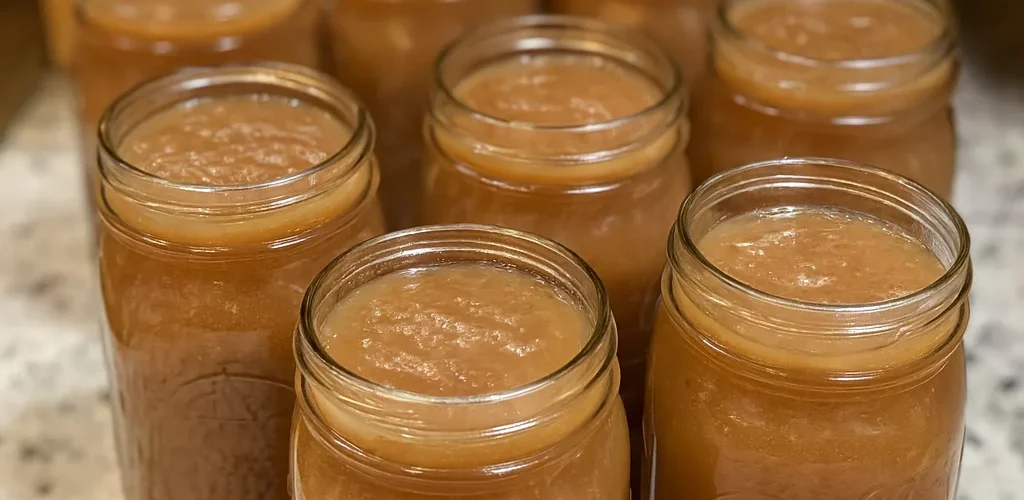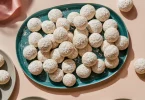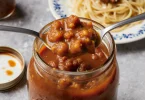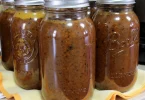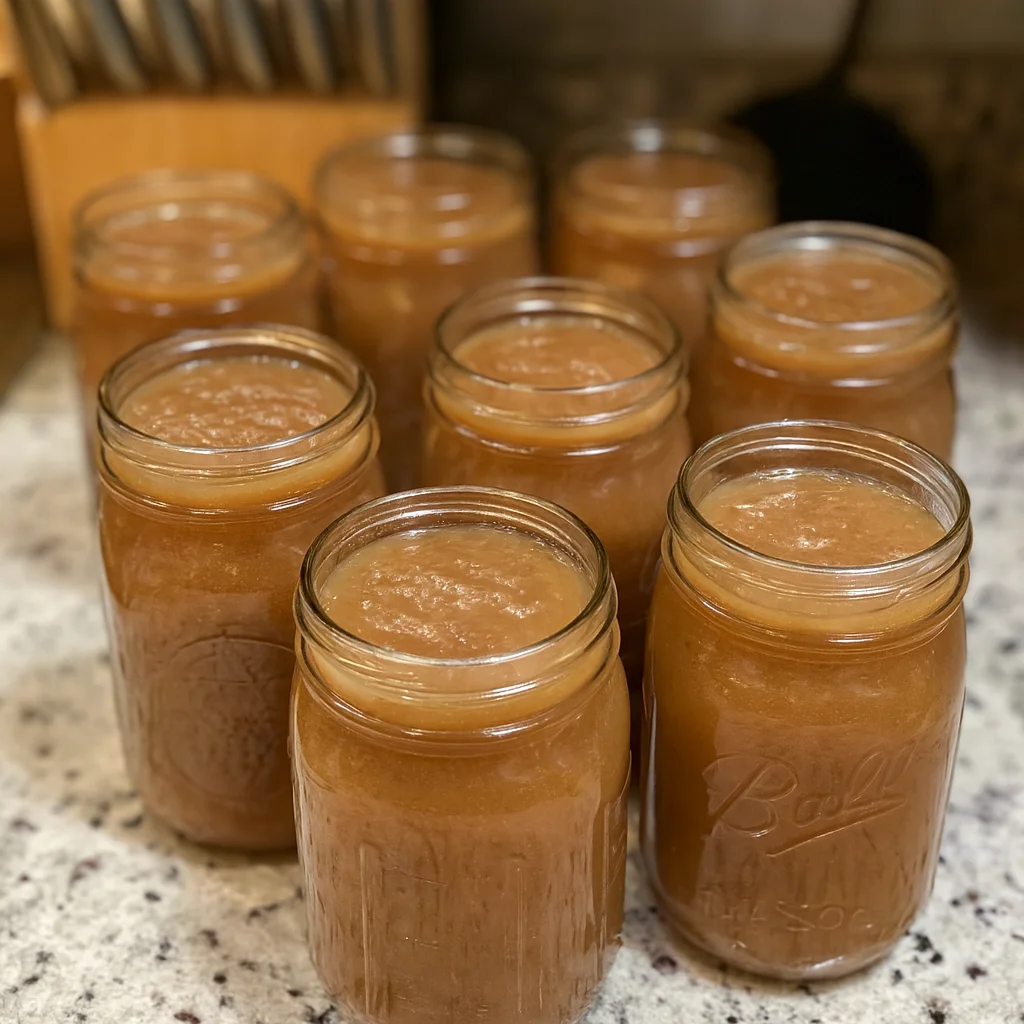
Introduction
Close your eyes and picture this: It’s a crisp autumn morning. The air outside smells like leaves and woodsmoke, and your kitchen is filled with the warm aroma of apples slowly simmering with cinnamon, cloves, and nutmeg. On the stove, a pot bubbles gently, transforming humble apples into something rich, spiced, and comforting: apple butter.
If you’ve ever had a spoonful of apple butter spread across warm toast or dolloped on a biscuit fresh from the oven, you know that it’s not just food—it’s a memory. For many, it’s a reminder of childhood kitchens, cozy family breakfasts, or jars gifted during the holidays. Unlike store-bought spreads, homemade apple butter is fresher, more flavorful, and deeply personal.
This article will guide you through making the best apple butter recipe at home. You’ll learn what makes apple butter special, how to prepare it step by step, variations to try, storage tips, health benefits, and creative ways to serve it. By the end, you’ll not only know how to make apple butter—you’ll understand why this recipe has been cherished for generations.
H2: What is Apple Butter?
H3: A Spread with Deep Roots
Apple butter isn’t new—it has been around for centuries. Originating in Europe and carried over to colonial America, apple butter became a way to preserve the apple harvest for the colder months. Unlike applesauce, which is simply cooked apples, apple butter is slow-cooked until the sugars caramelize, creating a deep brown color and rich, spiced flavor.
H3: How It Differs from Applesauce
- Texture: Apple butter is thicker, smoother, and spreadable.
- Color: Caramelization gives it a darker, golden-brown hue.
- Flavor: Applesauce is light and fresh, while apple butter is bold, sweet, and spiced.
- Cooking Time: Apple butter takes longer, sometimes hours, to achieve its signature richness.
This transformation is what makes apple butter unique. You’re not just making sauce—you’re creating a spread that feels indulgent but remains wholesome.
H2: Why You’ll Love This Apple Butter Recipe
When you make apple butter at home, you’ll quickly realize it’s more than a recipe—it’s an experience.
- Unmatched flavor: The slow cooking process intensifies the apples’ natural sweetness.
- Customizable: You decide how much sugar or spice goes in.
- Healthy alternative: No artificial flavors, preservatives, or corn syrup.
- Versatile: Works as a spread, dip, glaze, or baking ingredient.
- Gift-worthy: Homemade apple butter makes a thoughtful holiday or hostess gift.
Each jar is a reflection of your care and creativity.
H2: Ingredients for Classic Apple Butter Recipe
The secret to the best apple butter lies in the right balance of apples, sugar, and spices.
H3: Core Ingredients
| Ingredient | Quantity | Notes |
|---|---|---|
| Apples (peeled & chopped) | 6 lbs | Use a mix of sweet and tart (Gala, Fuji, Granny Smith) |
| Apple cider | 1 cup | Adds depth and natural apple flavor |
| Brown sugar | 2 cups | Provides caramelized sweetness |
| Granulated sugar | 1 cup | Balances tartness |
| Cinnamon | 2 tsp | Warm spice, essential to flavor |
| Nutmeg | ½ tsp | Adds depth and complexity |
| Cloves | ½ tsp | Strong spice, use sparingly |
| Vanilla extract | 1 tsp | Smooth finish |
| Salt | ¼ tsp | Enhances and balances sweetness |
H3: Optional Additions
- Maple syrup: For a richer, smoky sweetness.
- Star anise: For a subtle licorice note.
- Lemon juice: To brighten flavor and balance richness.
H2: Step-by-Step Guide to Making Apple Butter
H3: Step 1 – Prepare the Apples
- Wash, peel, and core the apples.
- Chop into small chunks for even cooking.
- Use a mix of sweet and tart apples for balance.
H3: Step 2 – Slow Cook the Mixture
- Place apples in a slow cooker or heavy-bottomed pot.
- Add apple cider, sugars, cinnamon, nutmeg, cloves, and salt.
- Stir to coat.
- Cook on low for 8–10 hours, stirring occasionally.
H3: Step 3 – Blend and Thicken
- Use an immersion blender to puree apples until smooth.
- Continue cooking uncovered for 1–2 more hours, stirring often, until thick and spreadable.
H3: Step 4 – Store or Can
- Cool apple butter slightly.
- Transfer to sterilized jars.
- Refrigerate for up to 3 weeks, freeze for up to 12 months, or process in a water bath canner for up to 18 months of shelf life.
H2: Variations of Apple Butter Recipes
Apple butter is versatile. Try these twists:
- Crockpot Apple Butter Recipe: Effortless, let it cook all day.
- Stovetop Apple Butter Recipe: Faster, but requires stirring and monitoring.
- No-Sugar-Added Apple Butter Recipe: Rely on apples’ natural sweetness, maybe add honey.
- Maple Apple Butter Recipe: Replace some sugar with maple syrup for rich flavor.
- Spiced Apple Butter Recipe: Add cardamom, ginger, or allspice for extra warmth.
H2: Tips for the Best Apple Butter Recipe
- Use mixed apple varieties for depth of flavor.
- Don’t rush—slow cooking brings out caramelized richness.
- Taste as it cooks and adjust sugar or spice.
- Leave the lid off near the end for thick consistency.
- Always sterilize jars if planning to can.
H2: Common Mistakes to Avoid
- Using only one apple type: Results in flat flavor.
- Adding too much sugar early: Apples sweeten as they cook. Taste before adding more.
- Skipping stirring: Can lead to sticking or burning.
- Not cooking long enough: Texture will be thin and saucy instead of spreadable.
- Improper sealing: Leads to spoilage.
H2: Storage and Shelf Life
- Refrigerator: Lasts up to 3 weeks.
- Freezer: Store in airtight containers for 6–12 months.
- Canned: Water bath processed jars last up to 18 months.
Always check jars before eating. If the seal is broken or contents look off, discard.
H2: Serving Ideas for Apple Butter
Apple butter is more versatile than you might think. Try it:
- Spread on toast, bagels, or biscuits.
- Swirled into yogurt or oatmeal.
- As a filling for cakes, crepes, or quick breads.
- Glazed over pork chops or chicken.
- Mixed into BBQ sauce or marinades.
- Packaged in jars as holiday gifts.
H2: Nutritional Information (Approximate per Tablespoon)
| Nutrient | Amount |
|---|---|
| Calories | 35 |
| Carbohydrates | 9g |
| Sugar | 8g |
| Fiber | 0.5g |
| Vitamin C | 2% DV |
(DV = Daily Value based on a 2,000-calorie diet)
H2: FAQs About Apple Butter Recipe
H3: How long does homemade apple butter last?
Up to 3 weeks refrigerated, 12 months frozen, or 18 months canned.
H3: What apples are best for apple butter?
A mix of sweet and tart apples like Gala, Fuji, Honeycrisp, and Granny Smith.
H3: Can I make apple butter without sugar?
Yes—rely on apples’ natural sweetness or add honey or maple syrup instead.
H3: Is apple butter the same as applesauce?
No. Apple butter is cooked longer, darker, thicker, and more spiced.
H3: Can I use apple butter in baking?
Absolutely—use it in quick breads, muffins, cakes, or as a substitute for oil or sugar.
Conclusion
The apple butter recipe you’ve just learned is more than a set of instructions—it’s a way to connect with tradition, celebrate the season, and bring comfort to your kitchen. With just a few simple ingredients and a little patience, you can turn apples into a rich, spiced spread that transforms breakfast, snacks, and even dinner.
By now, you know how to prepare apple butter step by step, how to store it safely, how to customize it, and how to serve it in creative ways. Most importantly, you have the knowledge to avoid common mistakes and ensure every jar turns out perfectly.
👉 Your Call-to-Action: Don’t wait for autumn—grab some apples, try this recipe, and see how easy it is to bring comfort and flavor to your table. Share a jar with a friend, spread it on fresh bread, and enjoy the simple joy of homemade apple butter.

